Before we get into the ins and outs of a HEPA air, we need to know what HEPA is.
HEPA stands for High-Efficiency Particulate Air. The US Department of Energy has strict guidelines for air filters to meet HEPA status, and that means that HEPA filters will give you some of the cleanest air from an air purifier.
HEPA filters must remove 99.97 percent of the particulates that are less than 0.3 microns in size. Particles this small include pet particles, mold, dust mites, pollen, and other allergens. And, any larger particles are taken care of by the filter too.
HEPA air purifiers use HEPA filters to filter the air, so when you use one, you know that you are filtering out almost everything from the air, and you can be sure that the air you are breathing is clean.
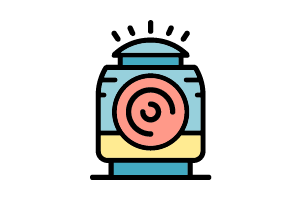
How Do HEPA Filters Work?
We know that HEPA filters remove 99.97% of small particles from the air in your home, but how do they do that?
The HEPA filters are mats of fibers that trap the particles so that they cannot be recycled into the air that you are breathing. The fibers of the filters are arranged in a random pattern to better trap these particles, and there are three mechanisms that help to purify the air.
- Impaction: Particles stick to fibers that they come close to.
- Interception: Large particles stick to fibers that they collide with.
- Diffusion: Small particles collide with gas molecules and are not able to get through.
By using a combination of all three methods, HEPA filters stop 99.97% of particles.
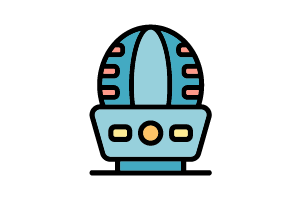
True HEPA vs. HEPA vs. HEPA-type
You see HEPA on the filter and grab it. You are good to go, right?
Well, not quite. In fact, you might be choosing a filter that does not remove 99.97% of particles. When you see HEPA, take a closer look to be sure that you are getting what you want. Many filters are HEPA-like or HEPA, but unless they are TRUE HEPA, you are not getting what you think you are.
So, what is the difference?
While they are all mechanical filters and all filter the air in much the same way, they do not filter the air to the same level. True HEPA filters are the ones that remove 99.97% of particles and are composed of high-density glass fibers that stop the particles. These are the kinds of filters that are found in most HVAC systems, vacuums, air conditioners, and HEPA air purifiers.
A HEPA, HEPA-like, or HEPA-based filter may look and act like a True HEPA filter, but you are not getting the clean air that you deserve. These type of filters have a 99% efficiency rate, which does sound impressive, but also means that they are letting a lot through. They can capture particles as small as 2 microns, where a True HEPA will capture particles as small as 0.3 microns. This means that allergens, pollutants, and germs are still getting through these other filters. The glass fiber in these filters are not as dense, and that is why so much still gets through.
For the cleanest air, make sure that you get a True HEPA filter.
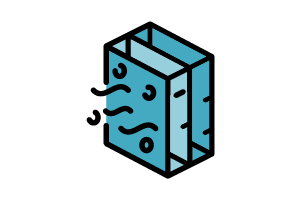
So, How Do I Know Which Is Which?
Sometimes it is not always obvious to tell from the packaging which filter is which, but there are three main ways to tell.
If the filter says ‘True HEPA’ on it, then it is a True HEPA filter. If it only says HEPA, it could be any of the HEPA options.
The second way is to check the manual or the website. This will usually tell you if it is True HEPA or not, but not always.
The most foolproof way is to check the efficiency of the filter on the packaging. If the efficiency is less than 99.97% or it does not stop particles as small as 0.3 microns, then it is not a True HEPA filter.
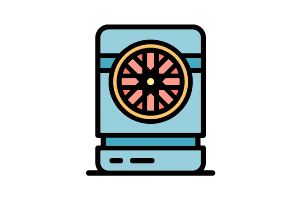
Other Air Filters for Air Purifiers
HEPA vs. Standard
Most filters in air purifiers, air conditioners, and other filtering equipment are standard filters. In essence, this means that you are usually not getting as clean air as you could, as standard filters do not filter to the level of HEPA filters.
Standard filters range in density and are used predominantly in homes and workplaces. There is a reason why HEPA filters are used in medical industries and high-risk areas, as well as becoming more popular in households.
If you want the cleanest air, choose a HEPA filter.
HEPA vs. Ionizer
An ionizer uses electrically-charged ions to create a bond between the particles and the filter. These ions become heavy when they attach to particles and fall to the floor of the unit or any flat surfaces.
Because the particles are not necessarily wiped up straight away, they can stay on surfaces, and the ions can lose their negative charge, resulting in the particles becoming airborne again. So, while ionizers are effective, there is some additional work for you to do.
HEPA vs. UV
UV (Ultraviolet) filters are not great for stopping particles, but they are perfect for destroying germs, bacteria, and mold. If we are comparing the two, there is no real contest as they are for different needs. If you want to boost the filtering power of a HEPA filter, then add some UV power to get the best of both worlds.
HEPA vs. Carbon
Carbon filters have small absorbent pores that react as particles pass through filters. The particles bond with the carbon and become trapped. This type of filter is better at trapping odors and chemicals, but when it comes to stopping dust and allergens, there is no competing with a HEPA filter.
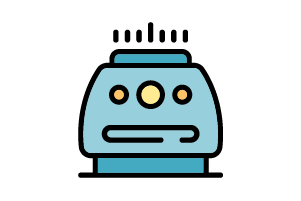
Why is Filtering Out Particles Important?
When it comes to particles, there are many different kinds, and HEPA filters will trap most, if not all, of them. When it comes to each one, there are many reasons why it is important to trap these particles.
Allergens
If you suffer from allergies, a HEPA filter is going to make your life better. These allergens come in many forms, including pollen, pet particles, dust mites, and more. These particles are responsible for many allergies, and if you filter them out, you are going to breathe a lot easier.
Asthma
If you have trouble breathing, whether it be because of asthma or anything else, filtering out all particles is going to help. Asthma can be caused by many things, and keeping your air as clean as possible is going to alleviate the symptoms.
Mold
Mold spores can enter your home and start to infect you, your family, and your home. If left unchecked, they can multiply and cause even more problems. When you filter out the root cause, you are creating a cleaner and safer home.
Toxins
If you have any chemical cleaners in your home, or if there are any toxins in the air, it is going to negatively affect your health. By filtering out any toxins, you are keeping the air clean, and you can breathe easier.
Dust
Not only do you not want to be breathing in dust (which can often contain human skin), you don’t want it to be making your home dirty either. As dust moves around your home, it often settles on surfaces and is later kicked up to land somewhere else. The longer you leave it before cleaning, the dustier your home will get. A HEPA filter will take care of your dust so that you can breathe easier and your home can remain cleaner.
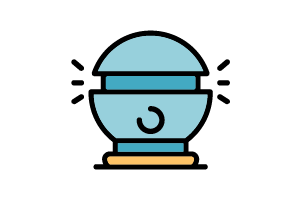
What’s a MERV Rating?
MERV stands for Minimum Efficiency Reporting Value and tells you how effective a filter is.
The MERV rating has a scale of 1-16, and the higher the MERV rating, the more particles the filter traps, and the more effective the filter is. So, if you want to be safe, opt for a higher MERV rating but, if you have a specific need, you can match that need to the rating on the scale.
The ratings have been around since 1987, and the number on the scale represents the lowest possible performance of the filter. So, should I just go for the highest possible rating?
No, and there is a reason for that. If you do need a filter that is on the upper end of the scale, you can go for that but, if you only need a regular filter, a filter with a 16 MERV rating is going to decrease the circulation of the air. The mesh in the filter is tightly bound and will stop more particles than other filters, but it will reduce the airflow in the process. With this in mind, it is better to choose a filter that fits your needs.
MERV 8
For typical household use, this is the type of filter that you should look for. They will catch small microns between 3-10 in size (meaning that you can find MERV 8 HEPA filters), and they are a distinct upgrade from regular filters.
MERV 11
MERV 11 filters are more tightly bound than MERV 8 filters and will trap more particles, giving you cleaner air without much of a price increase.
MERV 13
These will be fine for air purifiers but are not great for HVAC systems as they can limit the flow of air. If you are looking for a HEPA filter for your air purifier, this is as high as you should go on the MERV scale.
The one thing that you have to think about with MERV ratings is that the higher the MERV rating, the more particles will be trapped, but the less the air will flow. This also means that filters with higher MERV ratings will need to be switched out more regularly as they become blocked with particles.
Popular Articles on ComproGear
Compression Socks for Swollen Feet Stop Blood Clots
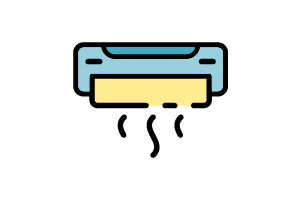
What Can a HEPA Air Purifier Filter Out?
HEPA filters are specifically designed to filter out small particles, but they do not capture everything. First, let’s take a look at what they can filter our before we look at what they cannot capture.
What They Are Good At
The most common way that HEPA filters benefit you is by capturing small particles like dust and pollen. They are great for keeping your air clean and helping you to breathe easier. They can also filter out mold, some bacteria, and most household allergens.
What They Are Not Good At
While HEPA filters will keep your air clean, they cannot stop everything. They are not great for filtering out smoke and other odors in your environment, and they cannot capture all toxins and viruses. While they will create cleaner air that will make for a healthier household, they cannot stop everything.
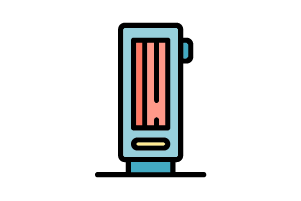
What Features to Look for in an Air Purifier
There are many air purifiers out there, and not all are created equal. Before you go out and buy an air purifier, there are some things to think about.
Use
You should know why you are buying an air purifier. If you want to filter out smoke or other odors, then you cannot buy just any air filter, and you will need to ensure that you are combining a HEPA filter with something like a carbon filter.
If you have pets or lots of dust particles, then you may want to choose a filter that can be used all day and night and one with a filter that can be easily cleaned or switched.
If you have severe allergies, you might want to opt for a filter with a higher MERV rating so that you can capture as much as possible. Just be sure to switch out the filter as often as you can.
You might want an air purifier that covers the entire room or one that is for desktop use. You do not want to buy one that will under- or over-perform. Think about your needs and match the air purifier to them.
Size
Generally, the larger the air purifier, the large the area that it can cover. So, if you want to purify the air in a large room, you should invest in an air purifier that is powerful enough to do the job.
The other thing to think about is the physical size of the unit. If you need to move the air purifier between rooms or place it into storage occasionally, you might want to spend more for a powerful air purifier that is small enough to move easily. You can also invest in an air purifier that comes on wheels if you want an appliance that is easier to move.
Features
Some air purifiers are basic and get the job done, while others come with a variety of features that add some extra benefits to your unit. Let’s take a look at some of the common features that you can look for:
- Energy Savers: Some air purifiers are powerful but use a lot of energy, while others are extremely energy efficient. You may have to pay more for a more efficient air purifier, but you can actually save money in the long run.
- Smart Purifiers: You can connect certain air purifiers to your smart device over your wifi, and this allows you to control the air purifier from your phone. When you are home, this is like having a remote, but you can take advantage and control the purifier when you are out of the home too.
- Displays: If you want ultimate control, look for displays that can give you real-time updates of the quality of air, along with the efficiency of the unit and the condition of the filter.
- Extras: We mentioned wheels already, but you can also benefit from remote controls, handles, multiple fan speeds, filter indicators, power indicators, and more.
- Maintenance: Choosing the cheapest air purifier may be the best deal initially, but you may end up spending more over time. Most filters need to be replaced after a certain period of time, but you can also find permanent filters that can be cleaned instead of replaced. If you invest in a quality unit, you are not going to need to perform as much maintenance as you would on a cheaper unit.
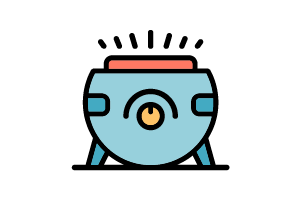
Can HEPA Air Purifiers be Quiet?
Yes, they can. If you buy a small air purifier that is cleaning the air in a small area, then the air purifier is going to be naturally quiet, but you may have to invest a little more if you want the purifier to be silent or if you want a large unit that is not going to make any noise. The larger the unit and the quieter you want the unit, the more you may have to pay.
One thing to think about when you are buying a quiet air purifier is to check the noise levels on each setting. Some air purifiers may be advertised as quiet, but that might only be on the lowest setting. If you buy a quiet air purifier only to find that you cannot run it on the highest setting, then you could be wasting your money.
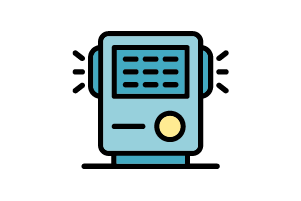
Why Use a Quiet HEPA Air Purifier?
There are many reasons to use a quiet HEPA air purifier. With so many people working and studying from home, it has never been more important to have a space that is quiet and with clean air.
If you are the kind of person who cannot work without silence, then a quiet air purifier is going to be perfect for you. The same also applies to those who cannot sleep with any noise. Sure, you can put in some earplugs, but that is not always comfortable for everyone.
If you want purified air but do not want a unit to be generating a lot of noise, no matter the reason, then a quiet air purifier is for you.
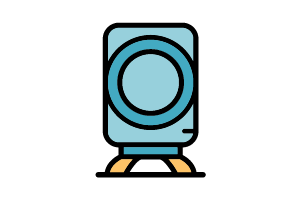
Maximizing Your HEPA Air Purifier
Buying a HEPA air purifier is the first step. The second step is to maximize the efficiency and use of your air purifier. Here are some simple steps to take.
- Source: If you are buying an air purifier to tackle a specific problem, then place the air purifier close to the source of the problem. For example, if you place it near your pet bed, then the pet particles are going to be filtered before they get to you.
- Electronics: Electronics work on different wavelengths, so try not to place the air purifier near other electronics to maximize the efficiency and performance of the device.
- Blockages: Try to place the air purifier so that it is not blocked. If you place the unit against a wall, it is not going to be able to pull in the air efficiently.
- Location: You may want to place the air purifier in the middle of the room to maximize airflow, but this is also the location where it is most in the way of foot traffic. Make sure that the air purifier is not going to be tripped over.
- Ventilation: Rooms should be ventilated, but if you are leaving doors and windows open, then you are letting more contaminants in that are going to need to be filtered.
- Use: You can move your air purifier between rooms if you want to. Us it while you work and then while you sleep.
- Maintain: Our top tip is to always replace or clean the filter when needed to maximize the efficiency of the filter.
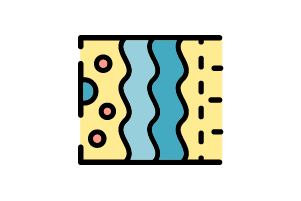
FAQs
Can You Wash/Clean and Reuse a HEPA Filter?
You cannot just wash and reuse any HEPA filter, but you can find permanent HEPA filters that can be washed and reused. If you try to wash a regular filter, you could accidentally damage it, and it will not work properly. Washable filters will cost a little more, but you never need to pay for replacement filters.
How Often Do You Have to Change a HEPA Filter?
An average HEPA filter will last for about a year, though the more you invest in quality, the longer the filter is going to last.
How Much Do HEPA Replacement Filters Cost?
You can get replacement filters for as low as $20-$30. If you want filters that can be washed and reused, expect to pay a little bit more.
What Size Room Does a HEPA Air Purifier Work On?
If you buy a regular air purifier with a HEPA filter, expect to purify a room of up to 500 square feet. If you have a larger room, you can invest in a purifier that can clean a room of 1,500 square feet and beyond.
Are HEPA Filters Safe to Use?
Yes, they are. They filter and purify the air, leaving you to breathe cleaner air. The only danger is if you do not replace or clean the filter and have more pollutants circulated around your home.
Who Should Use a Quiet HEPA Air Purifier?
If you are working or studying from home, you might want to invest in a quiet air purifier. There are many options out there, so if you need peace and quiet when you are in the room, invest in a quiet unit.
Where Can You Buy Quiet HEPA Air Purifiers?
HEPA filters will be available at all good hardware and home stores, and you will also find them online at most online retailers. Be sure to check the size and type of filter as not all filters are compatible with every unit.
This page last updated December 16, 2022